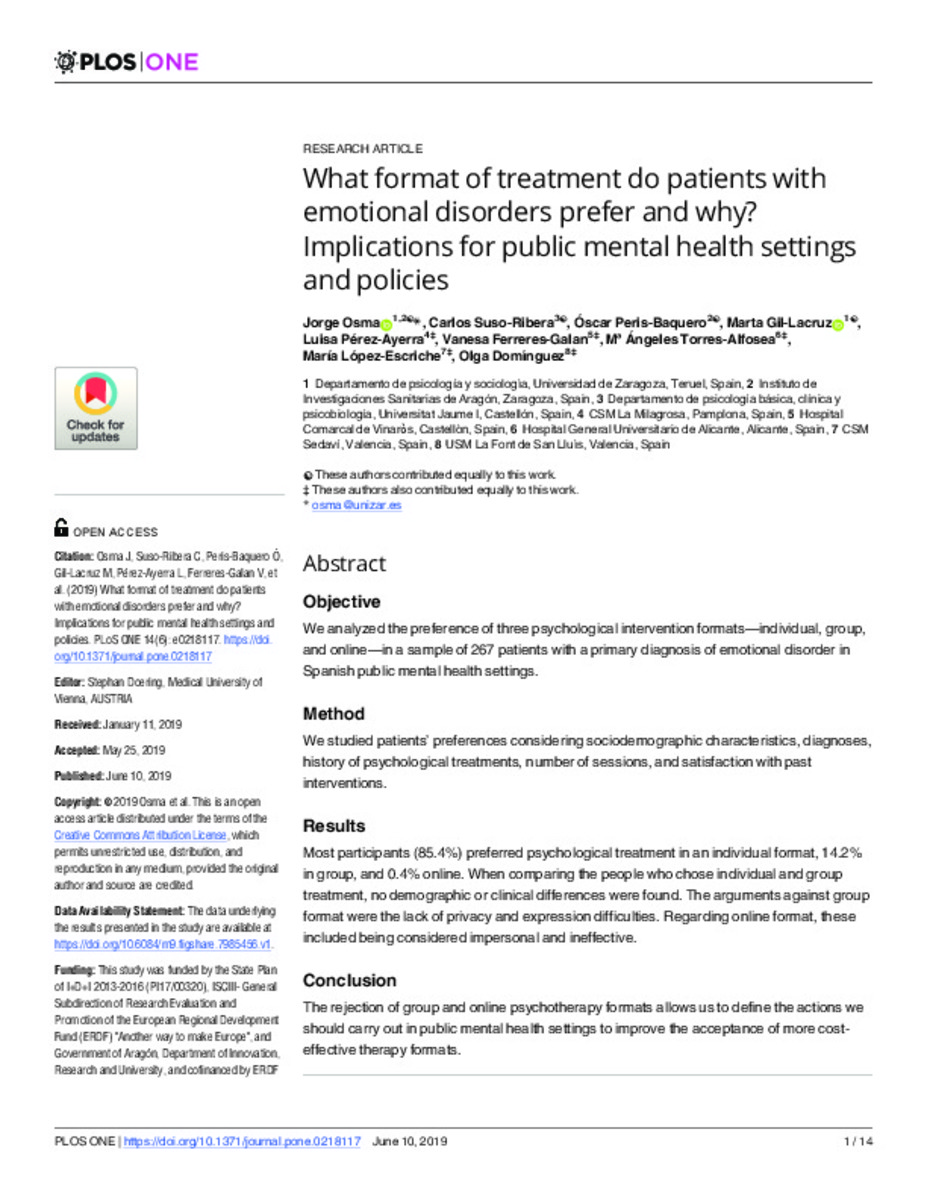Mostrar el registro sencillo del ítem
What format of treatment do patients with emotional disorders prefer and why? Implications for public mental health settings and policies
| dc.contributor.author | Osma López, Jorge Javier | |
| dc.contributor.author | Suso-Ribera, Carlos | |
| dc.contributor.author | Peris Baquero, Óscar | |
| dc.contributor.author | Gil Lacruz, Marta | |
| dc.contributor.author | Pérez Ayerra, Luisa | |
| dc.contributor.author | Ferreres-Galan, Vanesa | |
| dc.contributor.author | Torres-Alfosea, Mª Ángeles | |
| dc.contributor.author | López-Escriche, María | |
| dc.contributor.author | Domínguez, Olga | |
| dc.date.accessioned | 2019-07-10T10:32:56Z | |
| dc.date.available | 2019-07-10T10:32:56Z | |
| dc.date.issued | 2019 | |
| dc.identifier.citation | Osma J, Suso-Ribera C, Peris-Baquero O´, Gil-Lacruz M, Pe´rez-Ayerra L, Ferreres-Galan V, et al. (2019) What format of treatment do patients with emotional disorders prefer and why? Implications for public mental health settings and policies. PLoS ONE 14(6): e0218117. https://doi. org/10.1371/journal.pone.0218117 | ca_CA |
| dc.identifier.issn | 1932-6203 | |
| dc.identifier.uri | http://hdl.handle.net/10234/183165 | |
| dc.description.abstract | Objective We analyzed the preference of three psychological intervention formats—individual, group, and online—in a sample of 267 patients with a primary diagnosis of emotional disorder in Spanish public mental health settings. Method We studied patients’ preferences considering sociodemographic characteristics, diagnoses, history of psychological treatments, number of sessions, and satisfaction with past interventions. Results Most participants (85.4%) preferred psychological treatment in an individual format, 14.2% in group, and 0.4% online. When comparing the people who chose individual and group treatment, no demographic or clinical differences were found. The arguments against group format were the lack of privacy and expression difficulties. Regarding online format, these included being considered impersonal and ineffective. Conclusion The rejection of group and online psychotherapy formats allows us to define the actions we should carry out in public mental health settings to improve the acceptance of more costeffective therapy formats. | ca_CA |
| dc.format.extent | 14 p. | ca_CA |
| dc.format.mimetype | application/pdf | ca_CA |
| dc.language.iso | eng | ca_CA |
| dc.publisher | Public Library of Science | ca_CA |
| dc.relation.isPartOf | PLoS ONE 14(6): e0218117 | ca_CA |
| dc.rights | : © 2019 Osma et al. This is an open access article distributed under the terms of the Creative Commons Attribution License, which permits unrestricted use, distribution, and reproduction in any medium, provided the original author and source are credited. | ca_CA |
| dc.rights | Atribución 4.0 Internacional | * |
| dc.rights.uri | http://creativecommons.org/licenses/by-sa/4.0/ | * |
| dc.title | What format of treatment do patients with emotional disorders prefer and why? Implications for public mental health settings and policies | ca_CA |
| dc.type | info:eu-repo/semantics/article | ca_CA |
| dc.identifier.doi | https://doi.org/10.1371/journal.pone.0218117 | |
| dc.rights.accessRights | info:eu-repo/semantics/openAccess | ca_CA |
| dc.relation.publisherVersion | https://journals.plos.org/plosone/article?id=10.1371/journal.pone.0218117 | ca_CA |
| dc.type.version | info:eu-repo/semantics/publishedVersion | ca_CA |
Ficheros en el ítem
Este ítem aparece en la(s) siguiente(s) colección(ones)
-
PSB_Articles [1292]
Articles de publicacions periòdiques
Excepto si se señala otra cosa, la licencia del ítem se describe como: : © 2019 Osma et al. This is an open
access article distributed under the terms of the
Creative Commons Attribution License, which
permits unrestricted use, distribution, and
reproduction in any medium, provided the original
author and source are credited.








